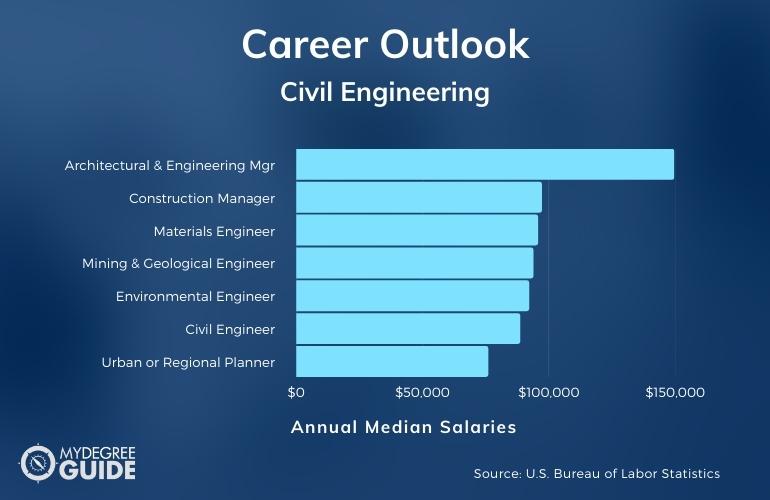If you want to open doors to a wide range of challenging and well-paid job opportunities, be sure to ask yourself if an online civil engineering degree is right for you.

You may assume civil engineers wear hard hats and carry blueprints around large construction sites. That’s one possibility. However, with today’s technology innovations and environmental challenges, the opportunities in this field are growing more diverse every day.
Editorial Listing ShortCode:
If you like Legos, paper airplanes, or building virtual cities with a gaming app and you excel at math, civil engineering may be the career for you!
In this article, we’ll explain more about online civil engineering courses, about getting an online bachelor’s degrees in civil engineering and the kinds of jobs you can pursue afterward.
Online Civil Engineering Degrees

A bachelor’s degree in civil engineering is a foundation for lots of jobs and for specialized licensing that can generate additional opportunities.
Many schools offer online civil engineering courses as part of all-online or hybrid degree programs. Keep in mind that civil engineering is just one option among related degrees emphasizing different engineering pathways.
These online engineering degree pathways include mechanical engineering, electrical engineering, energy engineering, aerospace engineering and avionics, environmental engineering, geological engineering, architecture, and construction management.
In many degree programs you will start your training with an overview of civil engineering concepts. Other topics you study are likely to include materials and their properties, structural design, project management, and industrial systems design.
Since the field has so many inter-related components, course outlines are likely to differ across programs and colleges. Since civil engineering projects are complex undertakings, don’t be surprised to discover you’ll also get courses focused on management, research, legal aspects of the work, and leadership skills.
Civil Engineering Careers & Salaries

Given that the engineering jobs vary by specialized skills and training, you will want to give some thought to which programs best match your future job vision and individual aptitudes and interests.
As the United States undertakes long-needed investments in infrastructure, there is every reason to believe the demand for civil engineering work will remain strong. Transportation infrastructure expansions, upgrades, and retrofitting projects alone are likely to create many jobs in the both the private and government sectors.
Space exploration is also a future-looking career sector that will rely heavily on skilled aerospace, mechanical, electrical, and computer engineers. Environmental policies and challenges will continue to drive demand for workers too.
Finally, if some of these occupations sound very technically demanding, well they are. However, there are many entry-level jobs and careers across the engineering spectrum as well. These include inspectors, surveyors, and technical assistants.
Overall, the Bureau of Labor Statistics projects that jobs in the engineering sector are on pace to grow about 3% for the next decade. That’s about as fast as the average for all careers measured.
Graduates with an online industrial engineering degree are slated to grow at a slightly higher rate, 10%, while the high-tech aerospace engineering field, interestingly, is forecast for slower growth, but offers high salaries.
Editorial Listing ShortCode:
According to the Bureau of Labor Statistics, these are just a sampling of the lucrative occupations you can find in this field:
| Careers | Annual Median Salaries |
| Architectural and Engineering Manager | $149,530 |
| Construction Manager | $97,180 |
| Materials Engineer | $95,640 |
| Mining and Geological Engineer | $93,800 |
| Environmental Engineer | $92,120 |
| Civil Engineer | $88,570 |
| Urban or Regional Planner | $75,950 |
| Surveyor | $65,590 |
| Construction or Building Inspector | $62,860 |
| Architectural or Civil Drafter | $57,500 |
As you can see, if you are willing to work for it, your online bachelor’s in civil engineering can open doors to many exciting jobs.
Career Opportunities for Women in Civil Engineering
Although many women do work in the field of civil engineering, it is fair to assume that the field today is missing out on talent because women are relatively under represented. According to the Bureau of Labor Statistics, women make up only 16% of the workforce in engineering careers.
Certainly, the profession is likely to benefit from greater equity and diversity, not less. If you have any reservations about a career in civil engineering due to gender inequities, consider seeking out online degree programs and prospective employers that make it part of their institutional culture to foster workforce diversity and gender parity.
This should help you feel confident you’re getting the same support, rewards, and opportunities as all of your peers.
Choosing an Online Bachelor’s in Civil Engineering Degree

If you’re interested enough to start shopping for programs and colleges to apply to, here are some things to think about when choosing a bachelor’s degree in civil engineering online program:
- Look at what topics or specializations in the engineering field are covered or not covered.
- Determine if all classes are offered online or just some.
- Check to see how flexible the online schedule is, especially if you plan to work as you pursue your degree.
- Compare the tuition costs at different colleges.
- Check how long the program takes to complete and if there is an accelerated track.
We suggest creating a short list of best options for your interests and then, when it’s time to decide, request more detailed information from the schools that interest you most.
Lastly, if you have already completed some general education course credits or some upper-division engineering courses, see if your prospective college will allow you to transfer those credits, saving you time and money later.
Civil Engineering Curriculum & Courses

While looking at course requirements for civil engineering programs, you can also explore and compare the course offerings for related degrees, such as an online chemical engineering degree, online mechanical engineering degree, or online electrical engineering degree.
Editorial Listing ShortCode:
Here are some of the courses likely to be required if you want to earn your bachelor’s degree online in civil engineering:
- Introduction to Civil Engineering: A broad overview of core mechanical and design concepts, professional standards and practices, laws, and career paths.
- Fundamentals of Building Construction: Discusses the foundational principles for designing and overseeing the building of safe roads, tunnels, bridges, and large buildings.
- Structural Design: A study of the physical properties and dynamics of both construction materials and structural modeling as they relate to building safe, efficient, and environmentally sound structures, foundations, including integrated energy and communication systems.
- Environmental Engineering: This kind of course will likely explore the intersection of environmental laws and engineering design and materials as well as providing knowledge of pollution control methods, wastewater management systems, and other engineering systems and mechanics related to infrastructure investments for a clean environment or for efficient energy generation and distribution.
- Construction Project Management: Learn about administrative management practices needed to facilitate complex engineering projects, including contracting, cost estimating, worker safety, regulatory compliance and other project management skills.
- Computer-Aided Design: Learn about the automated software tools used in both design and drafting and also for the production of key engineering materials and components.
- Principles of Surveying: Learn about land surveying, including geographical mapping, measuring slopes and grades, integrating land formation into construction design and related skills.
- Materials Analysis: Learn about the technical properties of diverse building and mechanical materials and about technical analysis techniques for the safe and efficient integration of both traditional and advanced materials in engineering designs.
Again, course requirements will vary and tend to reflect different sub-industry pathways within the larger field, something to keep in mind as you compare programs.
Admissions Requirements

If you have a high school diploma or your GED and have a satisfactory GPA, you may already be eligible for a number of online engineering degree programs. Prerequisites in math and science are likely to be important too.
Common admissions requirements for a bachelor’s degree online in civil engineering are likely to include:
- A high school diploma or G.E.D.
- Completion of relevant high school math and science classes, including physics and advanced algebra or even trigonometry and calculus
- A GPA of 2.5 to 3.0 for most schools (more than the required GPA may be needed to get into more competitive schools)
- Satisfactory SAT or ACT scores, for those programs and colleges still requiring these
If you have a high school diploma or G.E.D. but not all of the pre-requisite courses, look for colleges that allow you to incorporate those pre-requisites into your degree program. This should allow you to realize your career goals, even if it adds some extra time and cost to your overall degree requirements.
Accreditation

Since you’re making a serious commitment to realizing your career goals, we recommend you choose a fully accredited program. When you enroll in a properly accredited school, you can be more confident that your degree will earn you the recognition and job opportunities you are seeking.
Also, as CHEA (the Council for Higher Education Accreditation) points out, attending a school that is not accredited may impact your eligibility for government loans and other tuition assistance programs.
In addition, the Accreditation Board for Engineering and Technology (ABET) provides accreditation certification specifically for programs in engineering and technology.
Financial Aid and Scholarships

A bachelor’s degree involves several years of study, so we suggest you avail yourself of tuition assistance programs and school loans. Scholarships and loans are the most common forms of aid.
You may also be able to offset educational expenses by working part time as part of a federally subsidized “work study” program, if you are not already employed. If you are currently employed, see if your employer offers any tuition assistance programs for its employees.
Editorial Listing ShortCode:
If you do decide to apply for federal aid or subsidized student loans, filling out a FAFSA (Free Application for Federal Student Aid) is a good place to start.
What is Civil Engineering?

Water and sewer systems, bridges, tunnels, and highways, subway stations and airports, wind farms and solar power installations, virtually every type of large building or industrial plant…all of these projects are the accomplishments of trained civil engineers with different specialties and job descriptions.
Indeed, while civil engineering involves complex project management and specialized technical knowledge, it’s also likely to involve outdoor visits to construction sites alternating with indoor desk work.
In the end, you should also experience lots of job satisfaction from seeing your accomplishments and hard work take on very concrete form (no pun intended). As a civil engineer, you can be part of a highly trained workforce filling critical needs for a near limitless number of local and global physical infrastructure projects.
What Can You Do With a Civil Engineering Degree?

Your online bachelor’s degree in civil engineering can qualify you for a variety of engineering jobs and be a stepping stone for on-the-job learning, additional licensing, and lucrative job promotions.
According to the Bureau of Labor Statistics, more junior level jobs involve mapping, surveying, drafting, and computer-assisted production work.
Positions that may require more stringent qualifications and experience include those in architectural engineering, in advanced materials testing and analysis, and working on the design of integrated industrial and mechanical systems.
There are also roles that combine engineering expertise with leadership and management expertise, such as leading a design team or serving as the general manager of a large public works project.
How Much Does an Online Bachelor’s in Civil Engineering Cost?

Tuition costs for an online degree in civil engineering will vary significantly based on schools. Calculated yearly, tuition might amount to $8,000 to $20,000 for each year. For many programs, your tuition will be calculated based on credit hours.
The tuition cost per credit hour also varies by school, typically starting at around $300 per credit hour. Tuition at some schools may exceed $1,000. However, you should find many options that are less expensive.
How Long Does It Take to Get an Online Bachelor’s in Civil Engineering?
Like most baccalaureate programs, an online degree in civil engineering typically takes about 4 years based on a traditional 16-week semester of full-time enrollment. Some programs tell students to anticipate up to 5 years of study.
Keep in mind certain programs may also require completion of a senior project or research assignment. These kinds of final projects are common enough but can be a stumbling block for some people.
If you choose a program that offers an 8-week semester format with continuous, year-round enrollment, you may be able to finish in less time.
Is Civil Engineering a Good Degree?

If you have a bent for math and science and like building and technical systems and analysis, a degree in civil engineering is likely to fit your aptitudes. And, because technology innovation is a driver of new applications and practices, the demand for qualified talent shouldn’t be going away soon.
Editorial Listing ShortCode:
Furthermore, a degree in civil engineering can provide you with lots of career options based on your own interests and aptitudes. These options vary in the skill and talent they require, in the day-to-day duties you will perform, in terms of time spent indoors or outdoors, and in terms of earnings.
Can You Get a Civil Engineering Degree Online?
Many schools offer an online degree option. Although you may want to consider the pros and cons of studying in a traditional classroom setting vs. an all-online option, online options are fairly numerous and can provide lots more flexibility in both scheduling and school choice.
Finally, learning online may save you travel and living expenses, helping you contain the total cost of your degree program.
What Degree Do You Need to Be a Civil Engineer?

Most employers in the civil engineering field will be looking for candidates with a bachelor’s degree. Do some jobs require more advanced degrees?
The truth is that while you may at some point want to pursue an advanced degree once you have experience in the field, the bachelor’s degree is all typically all that is needed for a satisfying job search and for landing a good civil engineering job.
As in most professions, you may start out in a more entry-level position, but you should find lots of runway in front of you if you have your online bachelor’s degree.
What’s the Difference Between Civil Engineering vs. Mechanical Engineering?

While some concepts and knowledge overlap, civil engineers and mechanical engineers are likely to find themselves in quite different work environments and engaged in quite different tasks.
We have seen that civil engineers do the work of building roads, tunnels, airports, and more. Mechanical engineers, on the other hand, design machines.
If a civil engineering firms needs bulldozers to build a road or a massive excavator to bore an underground subway tunnel, it’s the mechanical engineers who get paid to design and build those bulldozers and excavators and the hydraulic and mechanical systems that power them.
If you’re more into schematics than architectural plans, if you like messing with pumps and generators, if you like power trains or heating and cooling systems, then mechanical engineering may be more your thing!
What’s the Difference Between Civil Engineering vs. Architecture?

The fact is civil engineers and architects are likely to work side by side on large construction projects. Civil engineers work from the drawings provided by architects.
Architects may also be trained civil engineers—able to do creative architectural design applying their knowledge of materials and structural mechanics. Obviously for larger, more complex public works projects, senior team leaders are likely to be trained in both architectural and civil engineering skills.
You should find some online civil engineering degree programs allowing you an educational concentration in a related specialization, such as architecture or environmental design, for example.
Is a Civil Engineering Degree Worth it?

Yes, a civil engineering degree is worth it for many students. In the architecture and engineering field, jobs are projected to grow at a rate of 3% in the next 10 years (Bureau of Labor Statistics).
Editorial Listing ShortCode:
Common careers in this field include project and construction management, structural design analyst, materials technician, renewable energy plant supervisor, and surveyor, among many others.
Your civil engineering bachelor’s degree will most likely require serious study, but it can provide a solid foundation for a lifetime of growing job opportunities.
Civil engineering is a field that offers work opportunities in the town where you live today or somewhere on the other side of the globe, with opportunities to work for the government, a local family-owned company, or a multinational corporation, working in a high-rise office building one day and getting your sleeves dirty at a construction site the next day.
Universities Offering Online Bachelor’s in Civil Engineering Degree Programs
Methodology: The following school list is in alphabetical order. To be included, a college or university must be regionally accredited and offer degree programs online or in a hybrid format.

Liberty University opened as a private university in 1971 and is well-known for its large student body and extensive course offerings. Liberty has more than seven hundred-degree offerings that allow students access to undergraduate and graduate degrees.
All programs offered at Liberty University has a Christian focus and can be entirely online or in-person.
- BS in Civil Engineering
Liberty University is accredited by the Southern Association of Colleges and Schools Commission on Colleges.

Established in1930, Old Dominion University has been helping to prepare students to be able to understand the fundamental concepts of their career choices since 1930. Old Dominion serves thousands of students annually who wish to earn an undergraduate or graduate degree through a public school using online or in-person learning.
Popular programs at ODU include civil engineering, education, and business.
- BS in Engineering Technology – Civil Engineering Technology
Old Dominion University is accredited by the Southern Association of Colleges and Schools Commission on Colleges.

The University of North Dakota has been giving student personalized learning paths since it was established in 1883.
Offering various learning options that lead to undergraduate and graduate degrees, this all-inclusive public school has hands-on learning programs for students looking to excel programs such as civil engineering, technology, mathematics, and many more.
- BS in Civil Engineering
The University of North Dakota is accredited by the Higher Learning Commission of the North Central Association of Colleges and Schools.
Getting Your Civil Engineering Degree Online

We hope this information helps you quickly find the right online degree program for your future career goals. Even more, we hope you’re excited…
Getting where you want to go may take some time, money, and hard work, so be sure to calculate the benefits and rewards in terms of a lifetime of well-paid work and expanding career opportunities as you plan your next steps!

